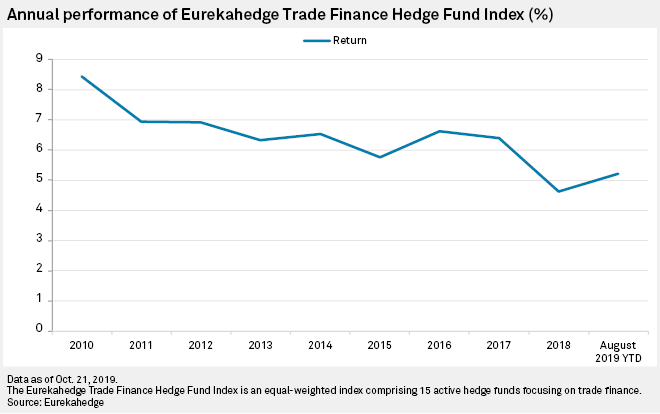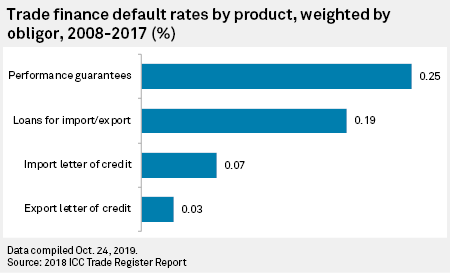A growing number of trade finance funds are emerging to meet demand from institutional investors seeking attractive returns with low correlation to stocks or bonds.
Banks, once dominant in trade finance, have been withdrawing from this space due to Basel III capital reserve requirements and other new regulations. Instead, lenders are focusing on larger corporate clients and are reducing exposure to trade finance, which consists of the financial instruments that companies use to facilitate international trade, such as letters of credit, performance guarantees, supply chain finance and import/export loans.
As banks retreat, there has been a worsening of the trade finance gap, measured in rejected trade finance applications, which is now between $1.4 trillion and $1.6 trillion, equal to 8% to 10% of global merchandise trade, according to the Asian Development Bank's estimates. The funding shortfall is particularly acute for small and medium-sized enterprises.
"Banks are looking at the best credit and are really out of the business of financing SMEs," said Marc de Hennin, head of business development at RiverRock European Capital Partners LLP, a U.K.-based investment management company. The minimum size for a transaction with the likes of Commerzbank AG, Citigroup Inc. and BNP Paribas SA is $50 million, he said.
Founded in 2009, RiverRock recently expanded into trade finance, joining a small but growing number of alternative financiers seeing opportunities in a cash-hungry market.
"There's more and more interest in this asset class and now more than ever because of the geopolitical and macroeconomic situation," de Hennin said. "Investors are looking for low volatility, non-correlated assets with the traditional market, and yield. By chance, trade finance ticks all the boxes."
Trade finance has also proven resilient to geopolitical turbulence. An analysis of 15 active trade finance-focused hedge funds found an average return of 4.73% throughout 2018, despite U.S.-China trade tensions, and a 5.22% gain in the first eight months of 2019, according to research firm Eurekahedge.

New players enter the market
De Hennin estimates that between 15 and 20 trade finance-focused funds exist globally, and expects this number to grow. They deploy varying strategies, with different risk appetite and return targets, and as with other funds investors buy an interest in a pool of assets.
Some of the first trade finance funds emerged after the financial crisis and were focused on emerging and frontier markets. Barak Fund Management, for example, launched its structured trade fund in 2009 and has since opened other funds, all focusing on Sub-Saharan Africa. It anticipates an 8% to 9% return per year based on past performance.
Some newcomers are targeting low-risk trade finance business. Earlier this year, London-based credit asset manager Channel Capital Advisors launched a Shariah-compliant trade finance fund aiming for "mid-single-digit returns," according to Paul Wilson, chief investment officer.
RiverRock is currently raising capital for a new supply chain finance fund that will support trade flows in and out of Europe with transaction sizes of $5 million to $15 million. Working in partnership with a European bank, it is targeting a 6% to 8% annual return for investors.
Other companies are looking to invest in bank-originated trade finance. Audentia Global is launching a credit fund that will participate in bank-originated transactions through synthetic securitization, allowing investors to invest in trade finance while giving banks more capacity to provide lending.
Banks are keen to distribute more of their assets to institutional investors in this manner. HSBC Holdings PLC, for example, recently partnered with Allianz Global Investors to launch a capital fund that will buy and offer to clients notes into which trade finance assets are wrapped.
Recession-proof asset class
The trade finance private-debt market investment has the potential to offer yields ranging between 50bps and 800bps above Libor for short-dated credit exposures of between 30 and 150 days, according to a 2018 report by global asset management company Insight Investment.
The secured and short-term nature of trade finance transactions have historically kept default rates low. The International Chamber of Commerce's 2018 Trade Register Report, which analyzed 25 trade finance and export finance banks' transactions from 2008 to 2017, showed low default rates for bank-generated trade finance businesses across all products and regions.
Low default rates contribute to a consistent return profile, according to a 2017 report by Greenwich Associates, a market intelligence company, which found that even during the worst of the financial crisis, the asset class did not post a single month of negative returns.

Need for education
Despite a growing interest in trade finance, educating investors about the asset class remains a hurdle.
"When you speak to institutional investors you spend a lot of time educating them on the risk profile of the transactions you want to invest in," said Nasim. "The industry consists of private companies, a lot of them don't issue corporate debt, and most institutional investors won't even have heard of some of the names, so therefore the classic way that they assess credit risk doesn't really apply to this industry."
The Greenwich study, which surveyed 56 key decision-makers at European institutional investors, found that only about one in 10 had a solid understanding of how secured and unsecured trade finance investments work.



